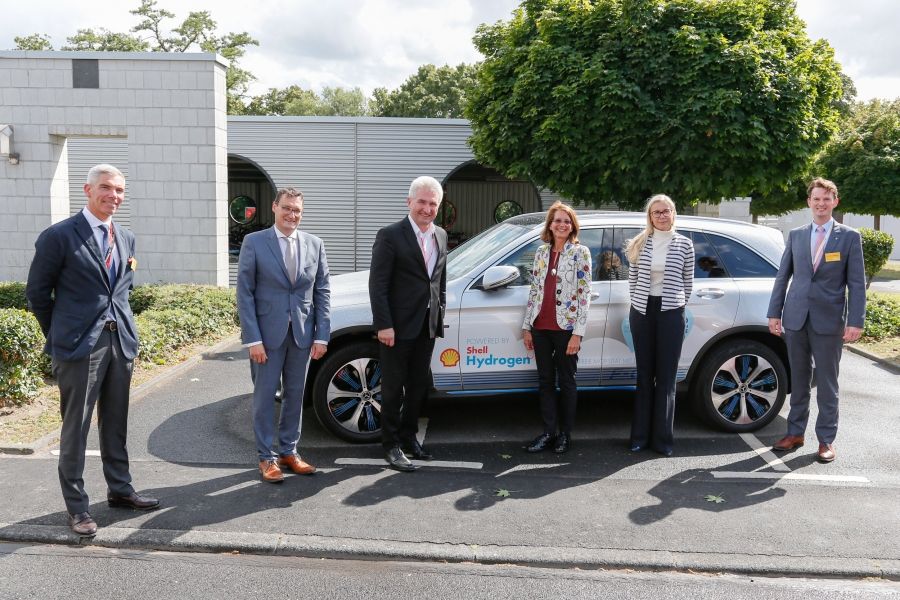News
EU Energy Commissioner visit to REFHYNE, the world’s largest PEM hydrogen electrolysis plant under construction
07 July 2020

News
07 July 2020

On 6 July, European Commissioner for Energy Kadri Simson visited REFHYNE, where the world’s largest PEM hydrogen electrolysis plant is under construction.
On 6 July, European Commissioner for Energy Kadri Simson visited REFHYNE, where the world’s largest PEM hydrogen electrolysis plant is under construction. Supported by the Fuel Cells and Hydrogen Joint Undertaking, REFHYNE will use renewable electricity to produce green hydrogen at Shell’s Rheinland Refinery in Wesseling, Germany.
Clean hydrogen is expected to play a vital role in the transition to a climate neutral Europe, helping decarbonise sectors that are harder to electrify, such as heavy industry or freight road transport. The EU hopes that REFHYNE will become a stepping stone in the journey to create a clean hydrogen economy. On 8 July, Commissioner Simson will unveil a European Hydrogen Strategy intended to create a market for clean hydrogen and incentivise investments in supply. Commissioner Simson believes that the EU can gain a competitive advantage by becoming a first mover in creating a clean hydrogen industry. Talking about her vision for the transition to a climate neutral Europe, the Commissioner said:
“To reach climate neutrality by 2050, we need to fundamentally transform our energy system and clean hydrogen will have a key role to play, as it has great potential to decarbonise sectors where electrification is impossible or too costly. Therefore, we will propose a roadmap to scale up renewable hydrogen production and use in Europe. Europe is well placed to be the global frontrunner in this field, with our leading position in wind energy and with innovative projects like REFHYNE already underway.“ says Kadri Simson, EU Energy Commissioner.
“North Rhine-Westphalia is a hydrogen state and intends to further expand its leading position in the future. Already today, 30 percent of German hydrogen demand comes from the North Rhine-Westphalian industry. It is estimated that demand can double by 2030. That is why we need innovative solutions that contribute to a CO2-neutral coverage of hydrogen demand. REFHYNE illustrates the direction in which our industry must go in order to harmonize with our energy system of the future”, says Prof. Dr. Andreas Pinkwart, Minister of Economic Affairs, Innovation, Digitalisation and Energy of North Rhine-Westphalia.
“FCH-JU funded projects like REFHYNE give the opportunity to European electrolyser industry to build equipment that meets the strict standards of the European refining industry. They will help reducing the CO2 footprint of large industrial processes through the production and incorporation of green hydrogen. We are delighted that Commissioner Simson chose the REFHYNE project facility in the context of the EU Hydrogen Strategy that will be announced soon”, explains Bart Biebuyck, Executive Director of the FCH JU.
Dr Graham Cooley, CEO of ITM Power says, “We are proud to be providing Shell with the electrolysis plant which turns renewable energy into zero carbon footprint hydrogen. Green electrolysis has the potential to decarbonise many industrial processes that use hydrogen. This project will demonstrate its application, at pilot scale, for the first time in a working refinery. It shows how forward-thinking companies and governments together can meet our commitments to reduce emissions.”
Elisabeth Brinton, Shell Executive Vice President New Energies, says, “Shell is excited by hydrogen and sees huge potential in it. That is why we are committed to its development - as a storage vector for renewables and a net-zero energy source for commercial, industrial and transportation customers. The REFHYNE project is a great example of working with our partners to create the infrastructure that will help the EU meet its aim to be climate neutral by 2050. Shell has set its own ambition to become a net-zero emissions energy business by 2050, or sooner, in step with society.”
The REFHYNE project is at the forefront of the effort to supply Clean Refinery Hydrogen for Europe.
The electricity used in the 10-megawatt plant will be fully supplied by renewable energy sources, and the green hydrogen produced – around 1,300 tonnes per year – can be fully integrated into refining processes, for example for the desulphurisation of conventional fuels. The European Union is supporting the pilot plant through the Fuel Cells and Hydrogen Joint Undertaking (FCH JU). The PEM hydrogen electrolyser ("proton exchange membrane") is erected at the Wesseling site of the refinery. The builders are Shell and the energy equipment specialist ITM Power, other partners in the project are SINTEF, Element Energy and Sphera. If successful, it lays the foundation for future large-scale, commercial 100-megawatt industrial plants. For the Cologne area, the project contributes to the development of a new hydrogen model region, which is to build on activities around fuel stations, car and bus use and which can show the potential of hydrogen.